- Home
- Elmore Leonard
Trail of the Apache and Other Stories Page 16
Trail of the Apache and Other Stories Read online
Page 16
He was sorry he had shot the water bag, but what
could he say? God directs the actions of men in
mysterious ways.
The county authorities were disconcerted, but
they had to be satisfied with the apparent facts.
McKay and Allison were found ten miles from
Yucca Springs and brought in. There were no
marks of violence on either of them, and they
found three hundred dollars in McKay’s wallet. It
The Boy Who Smiled
175
was officially recorded that they died from thirst
and exposure.
A terrible way to die just because some damn
Apache couldn’t shoot straight. Peza-a survived because he was lucky, along with the fact that he was
Apache, which made him tougher. Just one of those
things.
Mickey continued living with his mother at the
subagency. His old Gallagher carbine kept them in
meat, and they seemed happy enough just existing.
Tudishishn visited them occasionally, and when
he did they would have a tulapai party. Everything
was normal.
Mickey’s smile was still there but maybe a little
different.
But I’ve often wondered what Mickey Segundo
would have done if that coyote had not run across
the mesquite thicket. . . .
7
Only Good Ones
Picture the ground rising on the east side of the
pasture with scrub trees thick on the slope and
pines higher up. This is where everybody was. Not
all in one place but scattered in small groups: about
a dozen men in the scrub, the front-line men, the
shooters who couldn’t just stand around. They’d
fire at the shack when they felt like it or, when Mr.
Tanner passed the word, they would all fire at once.
Other people were up in the pines and on the road
which ran along the crest of the hill, some three
hundred yards from the shack across the pasture.
Only Good Ones
177
Those watching made bets whether the man in the
shack would give himself up or get shot first.
It was Saturday and that’s why everybody had
the time. They would arrive in town that morning,
hear about what had happened, and, shortly after,
head out to the cattle-company pasture. Almost all
of the men went out alone, leaving their families in
town: though there were a few women who came.
The other women waited. And the people who had
business in town and couldn’t leave waited. Now
and then somebody came back to have a drink or
their dinner and would tell what was going on. No,
they hadn’t got him yet. Still inside the line shack
and not showing his face.
But they’d get him. A few more would go out
when they heard this. Also a wagon from De
Spain’s went out with whiskey. That’s how the saloon was set up in the pines overlooking the pasture
and why nobody went back to town after that.
Barely a mile from town those going out would
hear the gunfire, like a skirmish way over on the
other side of a woods, thin specks of sound, and
this would hurry them. They were careful, though,
topping the slope, looking across the pasture, getting their bearings, then peering to see who was
present. They would see a friend and ask about this
Mr. Tanner and the friend would point him out.
The man there in the dark suit: thin and bony,
178
ELMORE LEONARD
not big but looking like he was made of gristle and
hard to kill, with a mustache and a thin nose and a
dark dusty hat worn square over his eyes. That was
him. Nobody had ever seen him before that morning. They would look at Mr. Tanner, then across
the pasture again to the line shack three hundred
yards away. It was a little bake-oven of a hut, wood
framed and made of sod and built against a rise
where there were pines so the hut would be in
shade part of the day. There were no windows in
the hut, no gear lying around to show anybody
lived there. The hut stood in the sun now with its
door closed, the door chipped and splintered by all
the bullets that had poured into it and through it.
Off to the right where the pine shapes against the
sky rounded and became willows, there in the trees
by the creek bed, was the man’s wagon and team.
In the wagon were the supplies he had bought that
morning in town before Mr. Tanner spotted him.
Out in front of the hut, about ten or fifteen feet,
was something on the ground. From the slope three
hundred yards away nobody could tell what it was
until a man came who had field glasses. He looked
up and said, frowning, it was a doll: one made of
cloth scraps, a stuffed doll with buttons for eyes.
The woman must have dropped it, somebody said.
The woman? the man with the field glasses said.
A Lipan Apache woman who was his wife or his
woman or just with him. Mr. Tanner hadn’t been
Only Good Ones
179
clear about that. All they knew was she was in the
hut with him and if the man wanted her to stay and
get shot, that was his business.
Bob Valdez, twenty years old and town constable
for three weeks, carrying a shotgun and glad he had
something to hold on to, was present at the Maricopa pasture. He arrived about noon. He told Mr.
Tanner who he was, speaking quietly and waiting
for Mr. Tanner to answer. Mr. Tanner nodded but
did not shake hands and turned away to say something to an R. L. Davis, who rode for Maricopa
when he was working. Bob Valdez stood there and
didn’t know what to do.
He watched the two men. Two of a kind, uh?
Both cut from the same stringy hide and looking
like father and son: Tanner talking, never smiling,
hardly moving his mouth; R. L. Davis standing hipcocked, posing with his revolver and rifle and a cartridge belt over his shoulder and the funneled,
pointed brim of his sweaty hat nodding up and
down as he listened to Mr. Tanner, smiling at what
Mr. Tanner said, laughing out loud while still Mr.
Tanner did not even show the twitch of a lip. Bob
Valdez did not like R. L. Davis or any of the R. L.
Davises he had met. He was civil, he listened to
them, but, God, there were a lot of them to listen to.
A Mr. Beaudry, who leased land to the cattle
company, was there. Also Mr. Malsom, manager of
Maricopa, and a horsebreaker by the name of
180
ELMORE LEONARD
Diego Luz, who was big for a Mexican but never
offensive and he drank pretty well.
Mr. Beaudry, nodding and also squinting so he
could picture the man inside the line shack, said,
“There was something peculiar about him. I mean
having a name like Orlando Rincon.”
“He worked for me,” Mr. Malsom said. He was
looking at Mr. Tanner. “I mistrusted him and I believe that was part of it, his name being Orlando
Rincon.”
“I hired him two, three times,” Mr. Malsom
said. “For heavy work. When I had work you
couldn’t kick a man to doing.”
“His name is Johnson,” Mr. Tanner said. “There
is no fuzz-head by the name of Orlando Rincon.
I’m telling you, this one is a fuzz-head from the Fort
Huachuca Tenth fuzz-head cavalry and his name
was Johnson when he killed James C. Baxter a year
ago and nothing else.”
He spoke as you might speak to young children
to press something into their minds. This man had
no warmth and he was probably not very smart.
But there was no reason to doubt him.
Bob Valdez kept near Mr. Tanner because he was
the center of what was going on here. They would
discuss the situation and decide what to do. As the
law-enforcement man he, Bob Valdez, should be in
on the discussion and the decision. If someone was
Only Good Ones
181
to arrest Orlando Rincon or Johnson or whatever
his name was, then he should do it; he was town
constable. They were out of town maybe, but
where did the town end? The town had moved out
here now; it was the same thing.
Wait for Rincon to give up. Then arrest him.
If he wasn’t dead already.
“Mr. Malsom.” Bob Valdez stepped toward the
cattle-company manager, who glanced over but
looked out across the pasture again, indifferent.
“I wondered if maybe he’s already dead,”
Valdez said.
Mr. Malsom, standing heavier and taller and
twenty years older than Bob Valdez, said, “Why
don’t you find out?”
“I was thinking,” Valdez said, “if he was dead
we could stand here a long time.”
R. L. Davis adjusted his hat, which he did often,
grabbing the funneled brim, loosening it on his
head and pulling it down close to his eyes again and
shifting from one cocked hip to the other. “This
constable here’s got better things to do,” R. L.
Davis said. “He’s busy.”
“No,” Bob Valdez said. “I was thinking of the
man, Rincon. He’s dead or he’s alive. He’s alive
maybe he wants to give himself up. In there he has
time to think, uh? Maybe—” He stopped. Not one
of them was listening. Not even R. L. Davis.
Mr. Malsom was looking at the whiskey wagon;
182
ELMORE LEONARD
it was on the road above them and over a little ways
with men standing by it, being served off the tailgate. “I think we could use something,” Mr. Malsom said. His gaze went to Diego Luz the
horsebreaker, and Diego straightened up; not
much, but a little. He was heavy and very dark and
his shirt was tight across the thickness of his body.
They said that Diego Luz hit green horses on the
muzzle with his fist and they minded him. He had
the hands for it; they hung at his sides, not touching
or fooling with anything. They turned open, gestured, when Mr. Malsom told him to get the
whiskey and as he moved off, climbing the slope,
one hand held his holstered revolver to his leg.
Mr. Malsom looked up at the sky, squinting and
taking his hat off and putting it on again. He took
off his coat and held it hooked over his shoulder by
one finger, said something, gestured, and he and
Mr. Beaudry and Mr. Tanner moved a few yards
down the slope to a hollow where there was good
shade. It was about two or two-thirty then, hot,
fairly still and quiet considering the number of people there. Only some of them in the pines and down
in the scrub could be seen from where Bob Valdez
stood wondering whether he should follow the
three men down to the hollow. Or wait for Diego
Luz, who was at the whiskey wagon now, where
most of the sounds that carried came from: a voice,
a word or two that was suddenly clear, or laughter,
Only Good Ones
183
and people would look up to see what was going
on. Some of them by the whiskey wagon had lost
interest in the line shack. Others were still watching, though: those farther along the road sitting in
wagons and buggies. This was a day, a date, uh?
that people would remember and talk about. Sure, I
was there, the man in the buggy would be saying a
year from now in a saloon over in Benson or St.
David or somewhere. The day they got that army
deserter, he had a Big-Fifty Sharps and an old
Walker and I’ll tell you it was ticklish business.
Down in that worn-out pasture, dusty and spotted with desert growth, prickly pear and brittlebush, there was just the sun. It showed the ground
cleanly all the way to just in front of the line shack
where now, toward the midafternoon, there was
shadow coming out from the trees and from the
mound the hut was set against.
Somebody in the scrub must have seen the door
open. The shout came from there, and Bob Valdez
and everybody on the slope was looking by the time
the Lipan Apache woman had reached the edge of
the shade. She walked out from the hut toward the
willow trees carrying a bucket, not hurrying or
even looking toward the slope.
Nobody fired at her; though this was not so
strange. Putting the front sight on a sod hut and on
a person are two different things. The men in the
scrub and in the pines didn’t know this woman.
184
ELMORE LEONARD
They weren’t after her. She had just appeared.
There she was; and no one was sure what to do
about her.
She was in the trees a while by the creek, then she
was in the open again, walking back toward the hut
with the bucket and not hurrying at all: a small figure way across the pasture almost without shape or
color, with only the long skirt reaching to the
ground to tell it was the woman.
So he’s alive, Bob Valdez thought. And he wants
to stay alive and he’s not giving himself up.
He thought about the woman’s nerve and
whether Orlando Rincon had sent her out or she
had decided this herself. You couldn’t tell about an
Indian woman. Maybe this was expected of her.
The woman didn’t count; the man did. You could
lose the woman and get another one.
Mr. Tanner didn’t look at R. L. Davis. His gaze
held on the Lipan Apache woman, inched along
with her toward the hut; but must have known
R. L. Davis was right next to him.
“She’s saying she don’t give a goddamn about
you and your rifle,” Mr. Tanner said.
R. L. Davis looked at him funny. Then he said,
“Shoot her?” Like he hoped that’s what Mr. Tanner
meant.
“Well, you could make her jump some,” Mr.
Tanner said.
Now R. L. Davis was onstage and he knew it and
Only Good Ones
185
Bob Valdez could tell he knew it by the way he levered the Winchester, raised it
, and fired all in one
motion, and as the dust kicked behind the Indian
woman, who kept walking and didn’t look up,
R. L. Davis fired and fired and fired as fast as he
could lever and half aim and with everybody watching him, hurrying him, he put four good ones right
behind the woman. His last bullet socked into the
door just as she reached it and now she did pause
and look up at the slope, staring up like she was
waiting for him to fire again and giving him a good
target if he wanted it.
Mr. Malsom laughed out loud. “She still don’t
give a goddamn about your rifle.”
It stung R. L. Davis, which it was intended to do.
“I wasn’t aiming at her!”
“But she doesn’t know that.” Mr. Malsom was
grinning, turning then and reaching out a hand as
Diego Luz approached them with the whiskey.
“Hell, I wanted to hit her she’d be laying there,
you know it.”
“Well, now, you go tell her that,” Mr. Malsom
said, working the cork loose, “and she’ll know it.”
He took a drink from the bottle and passed it to
Mr. Beaudry, who drank and handed the bottle to
Mr. Tanner. Mr. Tanner did not drink; he passed
the bottle to R. L. Davis, who was standing, staring
at Mr. Malsom. Finally R. L. Davis jerked the bottle up, took a long swallow, and that part was over.
186
ELMORE LEONARD
Mr. Malsom said to Mr. Tanner, “You don’t
want any?”
“Not today,” Mr. Tanner answered. He continued to stare out across the pasture.
Mr. Malsom watched him. “You feel strongly
about this army deserter.”
“I told you,” Mr. Tanner said, “he killed a man
was a friend of mine.”
“No, I don’t believe you did.”
“James C. Baxter of Fort Huachuca,” Mr. Tanner said. “He come across a tulapai still this nigger
soldier was working with some Indians. The nigger
thought Baxter would tell the army people, so he
shot him and ran off with a woman.”
“And you saw him this morning.”
“I had come in last night and stopped off, going
to Tucson,” Mr. Tanner said. “This morning I was
getting ready to leave when I saw him; him and the
woman.”
“I was right there,” R. L. Davis said. “Right, Mr.
Tanner? Him and I were on the porch by the Republic and Rincon goes by in the wagon. Mr. Tanner said, ‘You know that man?’ I said, ‘Only that

 Charlie Martz and Other Stories: The Unpublished Stories
Charlie Martz and Other Stories: The Unpublished Stories Elmore Leonard's Western Roundup #2
Elmore Leonard's Western Roundup #2 Fire in the Hole
Fire in the Hole Tishomingo Blues (2002)
Tishomingo Blues (2002)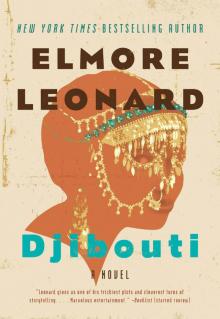 Djibouti
Djibouti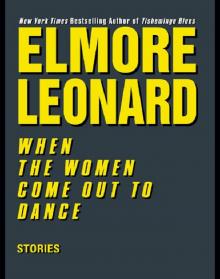 When the Women Come Out to Dance: Stories
When the Women Come Out to Dance: Stories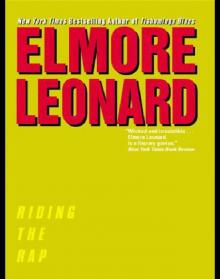 Riding the Rap
Riding the Rap Moment of Vengeance and Other Stories
Moment of Vengeance and Other Stories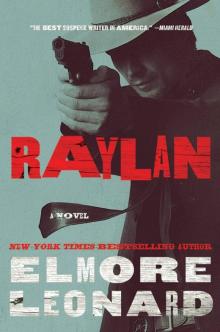 Raylan
Raylan Touch
Touch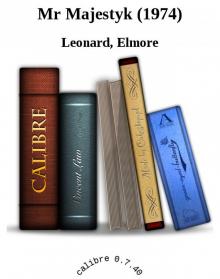 Mr Majestyk
Mr Majestyk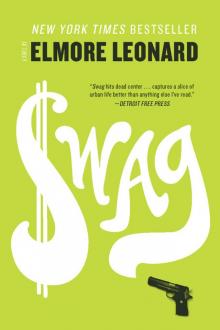 Swag
Swag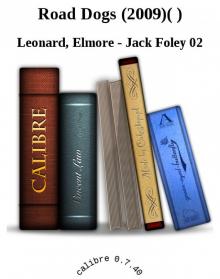 Road Dogs
Road Dogs La Brava
La Brava The Hot Kid
The Hot Kid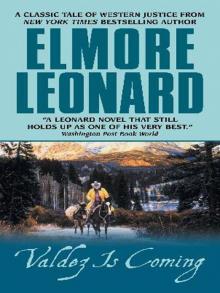 Valdez Is Coming: A Novel
Valdez Is Coming: A Novel Be Cool
Be Cool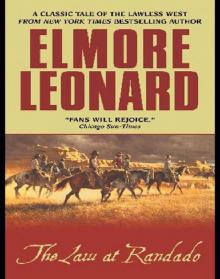 The Law at Randado
The Law at Randado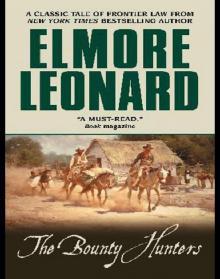 The Bounty Hunters
The Bounty Hunters When the Women Come Out to Dance
When the Women Come Out to Dance 310 to Yuma and Other Stories (1953)
310 to Yuma and Other Stories (1953)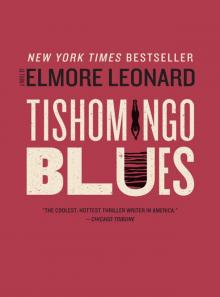 Tishomingo Blues
Tishomingo Blues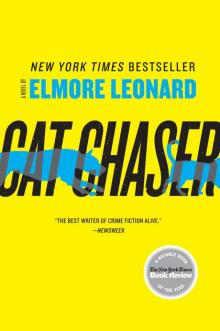 Cat Chaser
Cat Chaser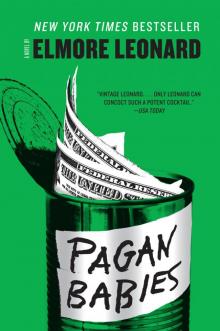 Pagan Babies
Pagan Babies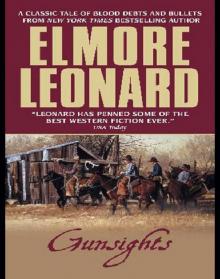 Elmore Leonard's Western Roundup #1
Elmore Leonard's Western Roundup #1 52 Pickup
52 Pickup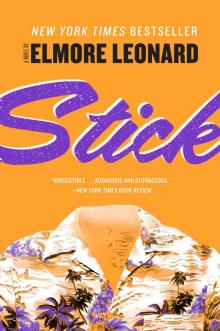 Stick
Stick The Moonshine War
The Moonshine War Valdez Is Coming
Valdez Is Coming City Primeval
City Primeval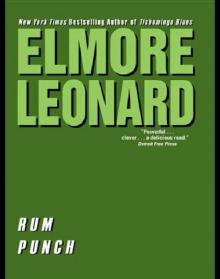 Rum Punch
Rum Punch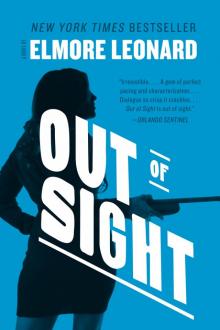 Out of Sight
Out of Sight Naked Came the Manatee (1996)
Naked Came the Manatee (1996)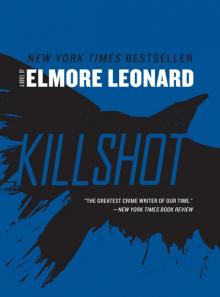 Killshot
Killshot Cuba Libre
Cuba Libre Forty Lashes Less One
Forty Lashes Less One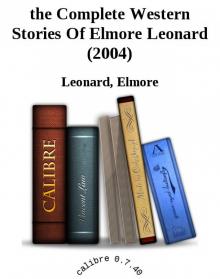 The Complete Western Stories of Elmore Leonard
The Complete Western Stories of Elmore Leonard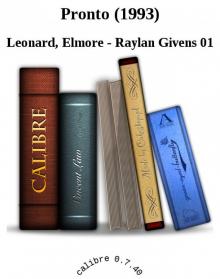 Pronto
Pronto Split Images
Split Images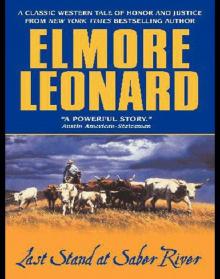 Last Stand at Saber River
Last Stand at Saber River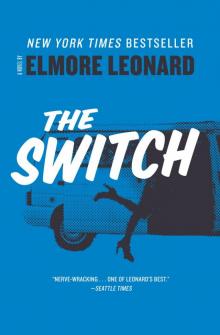 The Switch
The Switch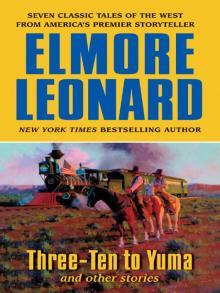 Three-Ten to Yuma and Other Stories
Three-Ten to Yuma and Other Stories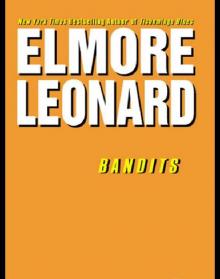 Bandits
Bandits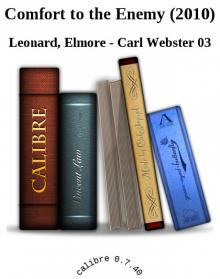 Comfort to the Enemy and Other Carl Webster Stories
Comfort to the Enemy and Other Carl Webster Stories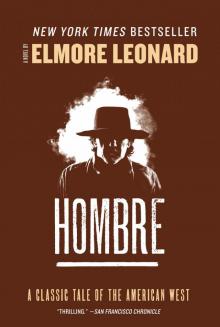 Hombre
Hombre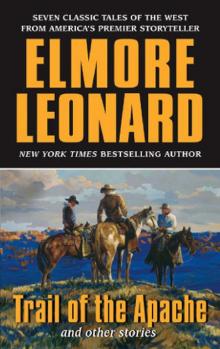 Trail of the Apache and Other Stories
Trail of the Apache and Other Stories LaBrava
LaBrava Gold Coast
Gold Coast Jackie Brown
Jackie Brown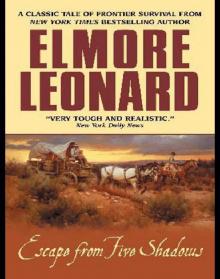 Escape From Five Shadows
Escape From Five Shadows Karen Makes out (1996)
Karen Makes out (1996)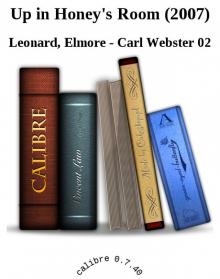 Up in Honey's Room
Up in Honey's Room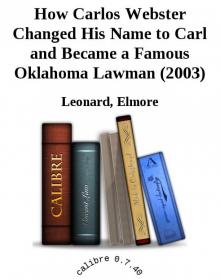 How Carlos Webster Changed His Name to Carl and Became a Famous Oklahoma Lawman (2003)
How Carlos Webster Changed His Name to Carl and Became a Famous Oklahoma Lawman (2003)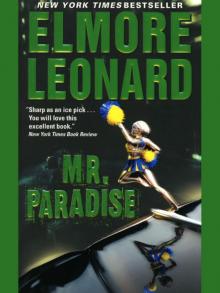 Mr. Paradise
Mr. Paradise The Hunted
The Hunted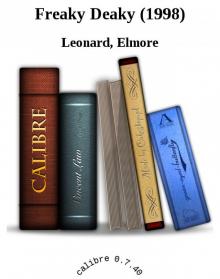 Freaky Deaky
Freaky Deaky Louly and Pretty Boy (Ss)
Louly and Pretty Boy (Ss)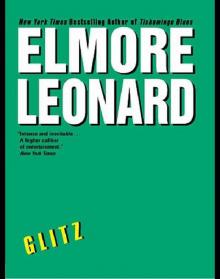 Glitz
Glitz A Coyote's in the House
A Coyote's in the House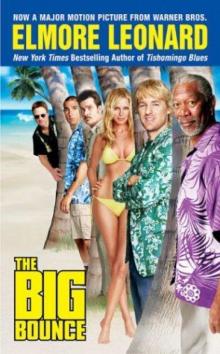 The Big Bounce jr-1
The Big Bounce jr-1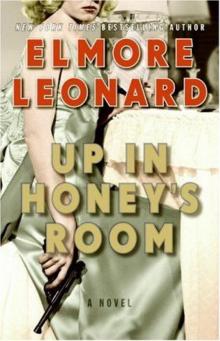 Up in Honey's Room cw-2
Up in Honey's Room cw-2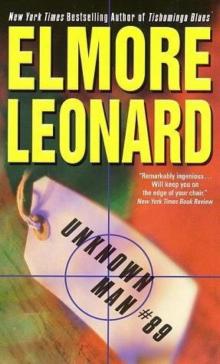 Unknown Man #89 jr-3
Unknown Man #89 jr-3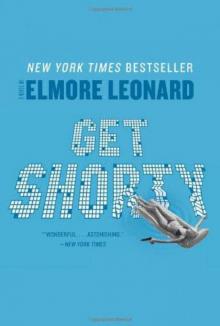 Get Shorty: A Novel cp-1
Get Shorty: A Novel cp-1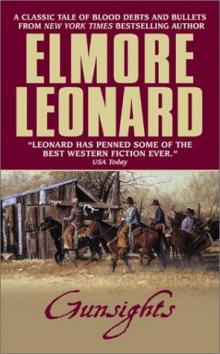 Gunsights
Gunsights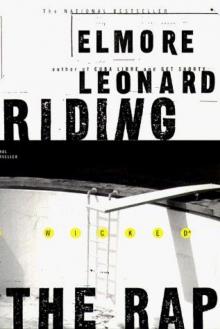 Riding the Rap rg-2
Riding the Rap rg-2